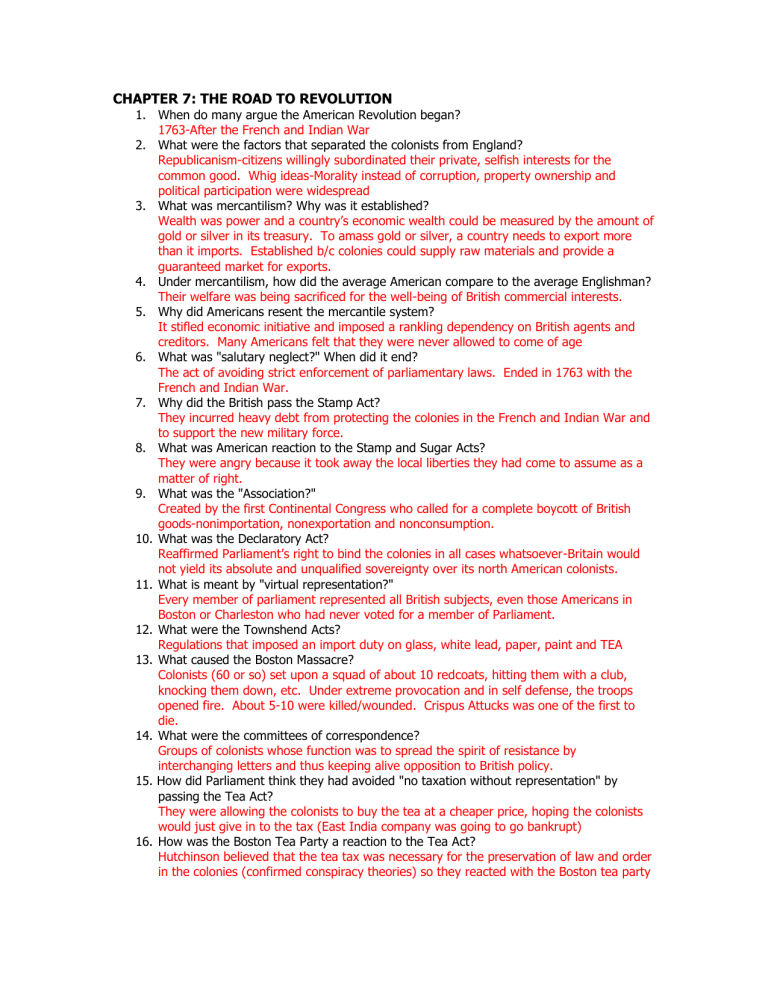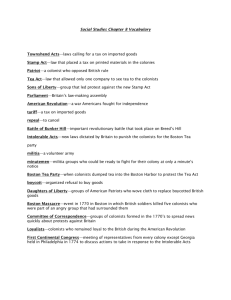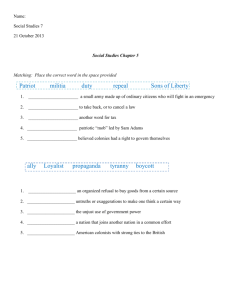CHAPTER 7: THE ROAD TO REVOLUTION

CHAPTER 7: THE ROAD TO REVOLUTION
1.
When do many argue the American Revolution began?
1763-After the French and Indian War
2.
What were the factors that separated the colonists from England?
Republicanism-citizens willingly subordinated their private, selfish interests for the common good. Whig ideas-Morality instead of corruption, property ownership and political participation were widespread
3.
What was mercantilism? Why was it established?
Wealth was power and a country’s economic wealth could be measured by the amount of gold or silver in its treasury. To amass gold or silver, a country needs to export more than it imports. Established b/c colonies could supply raw materials and provide a guaranteed market for exports.
4.
Under mercantilism, how did the average American compare to the average Englishman?
Their welfare was being sacrificed for the well-being of British commercial interests.
5.
Why did Americans resent the mercantile system?
It stifled economic initiative and imposed a rankling dependency on British agents and creditors. Many Americans felt that they were never allowed to come of age
6.
What was "salutary neglect?" When did it end?
The act of avoiding strict enforcement of parliamentary laws. Ended in 1763 with the
French and Indian War.
7.
Why did the British pass the Stamp Act?
8.
They incurred heavy debt from protecting the colonies in the French and Indian War and to support the new military force.
What was American reaction to the Stamp and Sugar Acts?
They were angry because it took away the local liberties they had come to assume as a matter of right.
9.
What was the "Association?"
Created by the first Continental Congress who called for a complete boycott of British goods-nonimportation, nonexportation and nonconsumption.
10.
What was the Declaratory Act?
Reaffirmed Parliament’s right to bind the colonies in all cases whatsoever-Britain would
11.
not yield its absolute and unqualified sovereignty over its north American colonists.
What is meant by "virtual representation?"
Every member of parliament represented all British subjects, even those Americans in
Boston or Charleston who had never voted for a member of Parliament.
12.
What were the Townshend Acts?
Regulations that imposed an import duty on glass, white lead, paper, paint and TEA
13.
What caused the Boston Massacre?
14.
Colonists (60 or so) set upon a squad of about 10 redcoats, hitting them with a club, knocking them down, etc. Under extreme provocation and in self defense, the troops opened fire. About 5-10 were killed/wounded. Crispus Attucks was one of the first to die.
What were the committees of correspondence?
Groups of colonists whose function was to spread the spirit of resistance by interchanging letters and thus keeping alive opposition to British policy.
15. How did Parliament think they had avoided "no taxation without representation" by passing the Tea Act?
They were allowing the colonists to buy the tea at a cheaper price, hoping the colonists would just give in to the tax (East India company was going to go bankrupt)
16.
How was the Boston Tea Party a reaction to the Tea Act?
Hutchinson believed that the tea tax was necessary for the preservation of law and order in the colonies (confirmed conspiracy theories) so they reacted with the Boston tea party
17.
What did the British do in response to the Boston Tea Party?
1774-passed the Intolerable Acts
18.
What were the Intolerable Acts? Why were they so unpopular?
The massacre of American Liberty. They shut down the Boston Harbor, placed restrictions on town meetings, colonists could be sent to Britain for trial. Accompanied by the Quebec Act allowed French subjects in Canada their Catholic religion and old customs and institutions. Unpopular because it set a dangerous precedent in America against jury trials and popular assemblies. Alarmed land speculators and aroused anti-
Catholics
19.
Why did the First Continental Congress meet? What did they accomplish?
To consider ways of redressing colonial grievances against the Intolerable Acts.
20.
What advantages/disadvantages did each side possess as the War for Independence began?
Britain had a professional army and colonists had a militia. Britain had money to hire
Hessians but also had other conflicts brewing (Ireland, France) England had more people than the colonists. Colonists had outstanding leadership, they were fighting defensively, self-sustaining, moral advantage from belief in a just cause. They were, however, badly organized for war. They were jealous of individual states and had many economic difficulties.
21.
What percentage of Americans supported total independence?
Only a select minority
22.
What role did economics play in causing the American Revolution?







